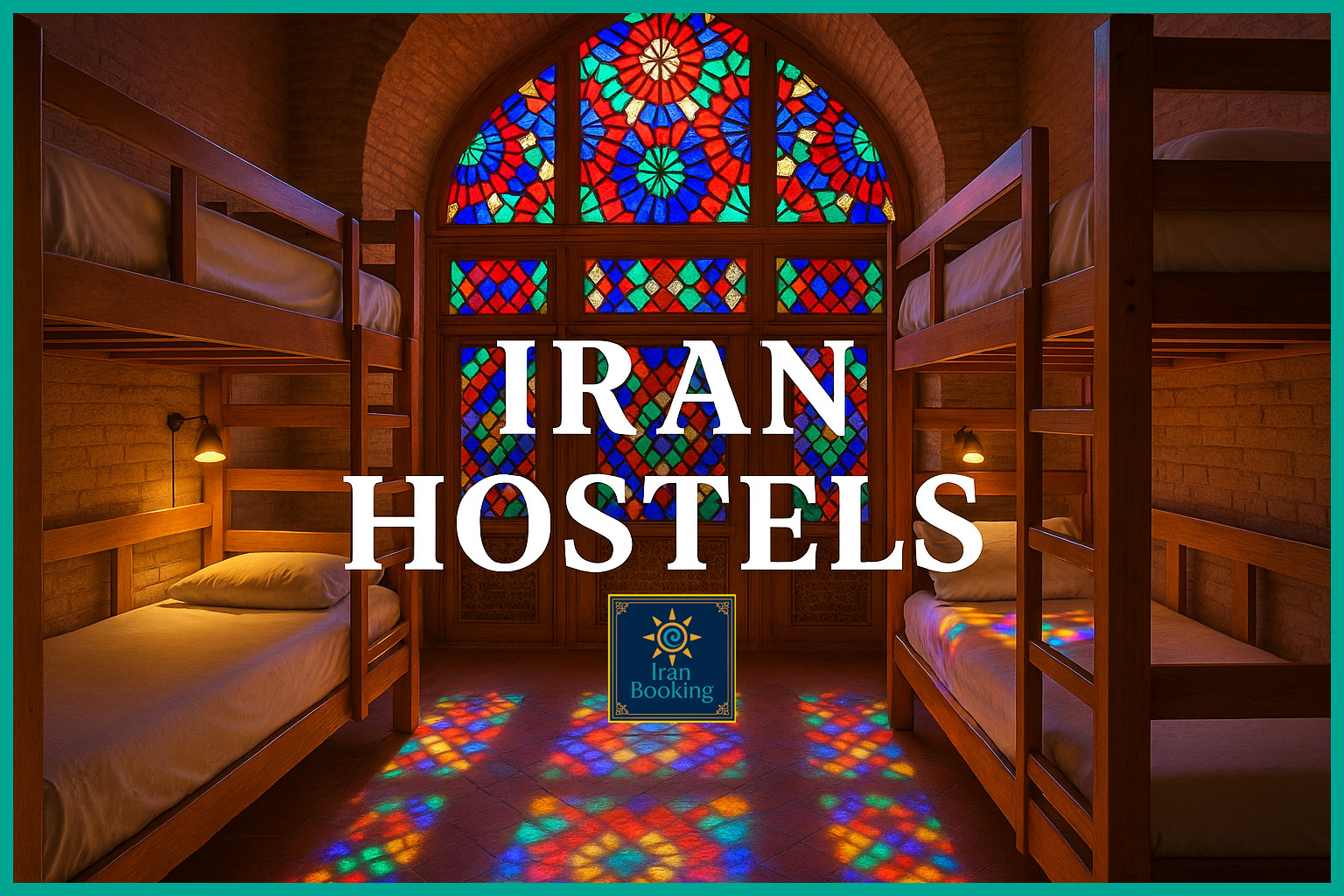

It is a universally acknowledged fact that visitors to a country must comply with its rules, laws and regulations. Once you enter a country, you are instantly within its territorial jurisdiction. In other words, you are required to abide by the rules defined in the Constitution of that country. In addition to such systems of law present in all 196 countries in the world, there are also certain codes and conventions specific to each ethnic group within a country that the foreign visitors are expected to observe in tandem with the Constitutional law. In Iran, such laws and principles are mainly founded upon two sources. One is the horde of national moral codes embedded in its glorious ancient history and the other is the official religion of the country, Islam. All Iranians irrespective of their religion and ethnicity live by certain principles and anyone planning to travel to Iran is advised to get acquainted with Iran facts and codes before embarking on their journey. Iran travel information includes rules like the Islamic code of Hijab, the ban on alcoholic beverages and drugs that are strictly enforced and are punishable according to law, etc. Others like Iranian moral code of Taarof or deference towards the elders are part of the culture and the visitors will garner further respect if they observe them. Respecting these simple principles is a prerequisite for traveling to Iran. According to Iranian laws concerning tourism, it is incumbent on the government to guarantee the safety and comfort and freedom of foreign tourists within the laws of the Islamic Republic of Iran.
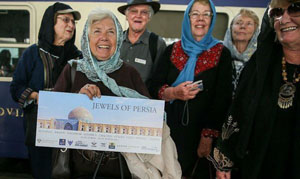
Taarof is a rule of etiquette and a widely practiced code of courtesy among Iranians. The simplest way to explain Taarof is that basically it involves a person insisting on doing someone a favor and the other person repeatedly declining it. For instance, if you are invited to someone’s house they will usually ask you to spend the night there which in most of the cases they don’t really mean it! You may ask why they are insisting on that if they are not sincere about it. The answer is that they are merely doing Taarof out of courtesy. A typical response to such a Taarof would be an effusive expression of gratitude while promising to fulfil the Taarof (spending the night) next time (which in most cases will never happen). There are many stock expressions of Taarof that people visiting Iran will hear numerous times. Persian Taarof phrases such as “ghaabeli nadare” or “mehmune ma bashid” (phrases meaning respectively “it is worthless” and “be our guest “often uttered by a salesman to imply that you can have the merchandise for free, which is obviously not true!) and “tashrif dashtid” (stated by a host who insists on you staying longer) are commonly used in daily conversation. However, Taarof phrases are usually uttered in formal conversation and are faded or totally dropped between friends and families.
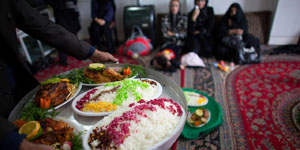
Hitchhiking was not very popular among the people and especially drivers at its first emergence in Iran a decade ago. But now colorfully attired hitchhikers are recurrently spotted on country roads around Iran and gregarious drivers who seek a road companion give them free rides at will. Iranian people enjoy chatting with travelers from other countries and many of hitchhikers are invited to their houses to dine and talk. Hitchhiking is indeed very safe in Iran but as with hitchhiking in any other place caution is advised. Although numerous police patrol cars secure the roads 24 hours, refer to your own sound judgment before any decision on the road. If you are an experienced hitchhiker you already know that sometimes a small dose of conservatism can’t hurt.
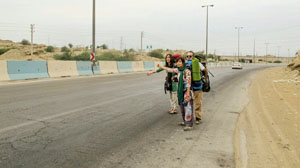
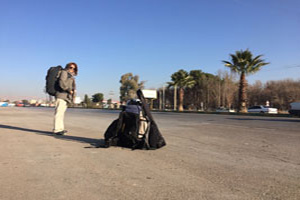
Officially speaking, Iran currency is named rial. Previously "toman" (تومان tumân) was Iran’s currency but about eighty years ago rial replaced toman as the official currency of Iran. Iranians however still use toman (10 rials) as the talk about their daily commercial transactions. But in formal documents including bank notes and vouchers the amounts are nearly always put down in rials. There have been negotiations between Iranian government and parliament to revert toman as Iranian currency and there is a strong possibility that toman will reclaim its position as the official currency of Iran after nearly eight decades. Iranians hold their money in high regard as the reward of their hard work; it shouldn’t come as a surprise when salesmen kiss the money before putting it in their pockets. There are many currency exchanges in Tehran but most of them are concentrated around Ferdowsi Square. Although most of the people working in the currency exchanges (called "Sarrafi" in Persian) know basic English, you can learn about the latest exchange rates just by checking out the numbers on the monitors. Three currencies namely Euro, US Dollar and British Pound are exchanged in all shops and some even accept some other international currencies. You can also know about the latest updates in Iran’s exchange rates by referring to official Iranian websites. The exchange rates are always in a flux so for correctly converting Iranian rial or toman to US dollar or euro you need to check the latest updates.
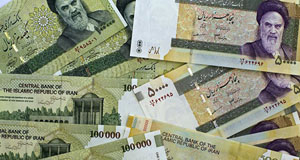
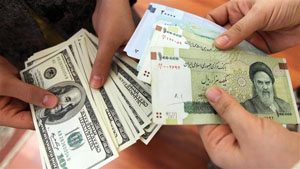
Due to the unjust American sanctions, Iran’s access to the international banking system is quite limited. As a result, none of the international credit/debit cards such as Visa and Master Cards are valid in Iran. The same goes for international online payments system such as PayPal and Worldpay. Most of Iranian citizens have their own national debit cards, exclusively available for the residents of the country, which can be used in all business transactions instead of cash. People can also use these cards for their ATM withdrawals all around Iran. Considering all the issues discussed above, the wisest thing to do for a visitor would be to bring enough cash. However, in case of an emergency, there are private companies in Tehran’s Ferdowsi Square that can transfer money to Iran from all over the world in exchange for a small commission (10-15 %).

Driving in Iran could be a challenge to a foreigner. Traffic, the huge number of motorcycles and pedestrians call for extra caution and concentration. The situation is even more intense in Tehran metropolitan area where one would wish to have eyes all around his head. As with most of the countries in the world, all freeways, highways, country roads and city roads have speed limits. Thousands of police cameras and police patrol cars control the safety of the roads and offenders are subjected to heavy fines or even the confiscation of their cars. To avoid such drastic measures, you must keep your speed under the limit which is between 50 and 80 km/h in cities and between 80 to 120km/h in freeways, highways and country roads. People must drive on the right side of the road and if they need to overtake, they must do it from the left side. There are also many speed bumps on the roads which are often marked but extreme caution is advised especially in remote country roads. For driving in Iran, you will just need an international driving license and a decent car. There are car rentals despite the fact that their customers are almost exclusively foreigners. You can arrange for a rental in Imam Khomeini Airport by booking beforehand. Influenced by the negative image prevalent in the western media coverage of Iran, many visitors ask: Can women drive in Iran? The answer is obviously positive. There has never been a law against women driving in Iran and in larger cities including Tehran one can even spot female taxi drivers.
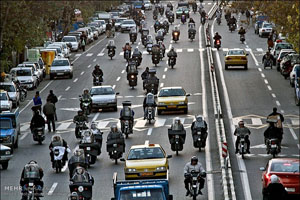
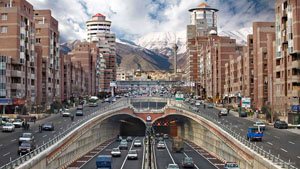
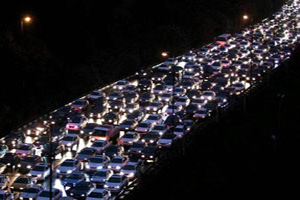
Hijab is an Arabic word deriving from the root hujb meaning modesty, decency, cover or shield. As an Arabic word, hijab has many definitions and meanings. But what is hijab in the social context? How to wear hijab? The hijab rule is observed in many Muslim countries including Iran. According to Islamic Sharia law, Iranian women are required to cover their bodies and their hair from men other than their fathers, brothers, uncles, husbands and fathers-in-law. For observing Hijab, the minimum requirements for a woman include long pants and a long-sleeved shirt (known here as manteau) over it. They are also required to cover their heads with a shawl or a scarf. For going to mosques and holy shrines you will need a Chador (a long veil covering the whole body) which will be freely distributed at the entrance. Men aren’t allowed to wear short pants but wearing a tie though not very common is ok. Moreover, any physical display of affection between men and women is forbidden in the public. And finally sexual relationships outside marriage is considered an offence in Iran and is punishable according to the law.
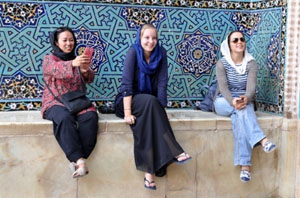
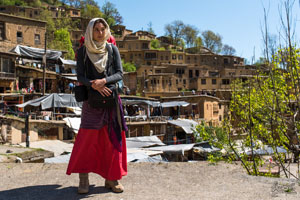
Known by many names such as Iran airport visa and Iran tourist visa, Iran visa on arrival (VOA) refers to Iran tourist visa received by tourists upon their arrival in Iran. VOA is exclusively for tourists. Others such as reporters, diplomats, businessmen etc. must apply for Iran visa via the embassy. Furthermore, Visa on arrival is only available at international airports. Therefore, those who intend to come to Iran by land must apply for a visa via Iranian embassy in their country of origin. Visa on arrival in Iran costs between 50 to 70 USD depending on your nationality (the prices are for 2017 and include health insurance). Visa (in some countries it is called visum) on arrival is issued at all international airports in Iran including Tehran’s Imam Khomeini Airport. The process is fairly simple. Upon getting off the plane follow the sign that says Visa on Arrival. This will lead you to a booth where you will be asked a couple of questions related to your trip to Iran. The next step is to pay the visa fee and then you will wait for half an hour until you get your visa.
Iran visa on arrival is a 90-day visa granted to eligible nationals in the world. Visa policy of Iran is thus very clear. The most important section in Iran visa requirements is your nationality. According to the latest update issued by Ministry of Foreign Affairs in 2017 all nationalities are eligible to apply for VOA bar the nationalities listed below:
Afghanistan, Bangladesh, Canada, Colombia, India, Iraq, Israel, Jordan, Pakistan, Somalia, UK and USA
On the other hand, nationals of Azerbaijan, Bolivia, Malaysia, Sri Lanka, Syria, Turkey and Venezuela may enter Iran without applying for any form of visa. Nationals of Israel may not enter Iran under any circumstances and the nationals of the USA, the UK and Canada must have an official tour guide with them all through their stay in Iran. Other requirements include a valid passport with at least six months left to the expiration date, the confirmation number of a reservation at an official a hotel or hostel (in the same city you have flown to) in Iran and finally some cash for paying the necessary fees. And lastly if you need to extent your visa, you can refer to any of the immigration offices in Tehran, Isfahan, Shiraz, Mashhad, Tabriz and other major cities.
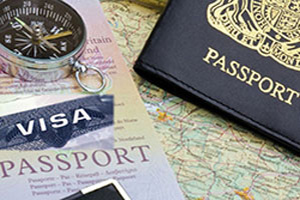
Imam Khomeini International Airport is the largest airport in Iran and its superb taxi service is the best in the country. Imam Khomeini International Airport Taxi (forodgah emam in Persian) also known by its code name IKIA provides drives from the airport to any places in Tehran Province. Other services like vans and even VIP buses could be arranged but for that you will need to contact the transportation companies in Iran before your arrival. Tickets to nearly all public transportation in Iran (bus tickets, metro,) are electronic. You can easily buy a prepaid electronic ticket and recharge it at bus and metro stations in Tehran. There are also one-way ordinary tickets but they cost a little more than the prepaid tickets. There are other private taxi services in Imam Khomeini Airport that we don’t usually recommend due to the reported cases of swindling. Among the reputable Tehran airport taxi services that transfer passengers to different locations in and around the capital are Iran Tourists Transportation Service (IranTTS) and Seirosafar (renders VIP services).
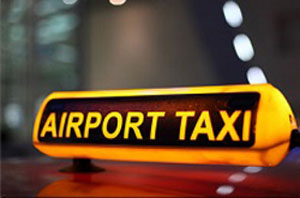
Being one of the largest and most populated metropolitans in the Middle-East, Tehran is well equipped with diverse sets of transportation that facilitates traversing around this colossal city. Tehran metro has five fully operational lines and another two which are currently under construction and upon their completion Tehran metro will cover all its districts. Tehran metro is huge but finding one’s way is really easy as you can find metro maps (updated in 2017 to include the new previously uncharted Tehran metro stations) everywhere in the stations and also in the trains. You can also get Tehran-Iran metro (subway) map from the internet in popular formats like pdf. Another means of public transportation in Iran's capital is Tehran BRT Bus system. These large vehicles have the capacity of moving over 50 people at a time and they are very fast due to their exclusive lines in streets and freeways. Similar to metro lines here you will find Tehran BRT buses map in every vehicle and station.
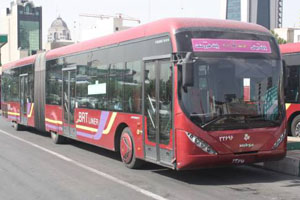
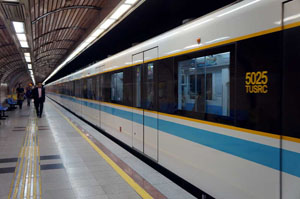
Iranians are famous in the world for their hospitality and gregarious manners. Together with the people of India and China, Iranian people boast the most ancient civilization in Asia which has brought along in the course of centuries a rich multifaceted culture and a plethora of customs each attributed to one of its many ethnicities. This long history of civilization has been shaped by many historical events from the first declaration of human rights issued by Cyrus the Great and the rule of ancient Persian kings to the Islamic period that further enhanced the already rich culture of Iranians. The behavior and manners of the people in Iran are the result of these centuries-old influences. Among the basic rules of etiquette in Iran one can mention respect to the elders and helping the poor.
As for souvenirs from Iran, there are many items from which you can choose. There are various Iranian gift shops that provide you with many different ideas and since Iran is deservedly famous for its handcrafts, you can be sure you won’t go back home empty-handed. As for the culture of giving gifts, tourists often wonder about what to bring to a Persian dinner or other formal gatherings. The most common thing is to buy cookies and other kinds of sweets. There isn’t much difference between Iranian dining etiquette and those of the western people. They usually start with the name of God and at the end everyone helps the host to clean the table and wash the dishes. Sometimes in more traditional households people may dine on the ground. In that case you shouldn’t step on the cloth on which you’ll be dining (sofreh). A frequently asked question about foods in Iran is: Are certain foods or beverages taboo in Iran? Well the answer is yes. Considering the country’s religious background, the use of any alcoholic beverages is forbidden and punishable according to law. Pork meat is also taboo as its usage is against the rule of Islam.
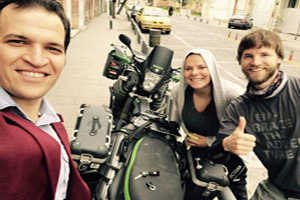

Handshake is part of a formal greeting in Iran, but men don’t shake women’s hand and vice versa. It is also custom to kiss your friends and relatives on the cheek. The same gender rule applies here too.

The ownership, production and usage of alcoholic drinks are illegal in Iran. Foreigners often ask questions such as: “can you drink alcohol in Iran hotels?”, “do Iranian hotels serve alcohol?” The answer is of cours: No you cannot! There are also no bars nor any nightclubs in Iran. There is obviously no Iranian alcoholic drink. However Iranian non-alcoholic beers are produced and used in abundance.

Official weekend in Iran is Friday but some companies and schools add another day i.e. Thursday to the weekend making it a two-day long weekend. Some people specially people of the capital use the weekend (that is Friday and in some cases Friday and Thursday) to go on a short trip.

Telecommunication companies in Iran provide international services. By buying a sim card you will be able to call anywhere you like around the world from Iran. Three major mobile network operators in Iran are Irancell, Hamrahe Aval (MCI) and RighTel whose sim cards provide 4G internet as well as common services. These sim cards can be easily purchased in Tehran Imam Khomeini Airport for a very modest price. You will be given special Irancell, MCI and RighTel balance check codes which will enable you to be always updated with your balance.
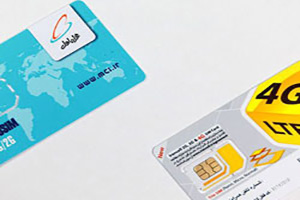
Questions such as "Is Facebook or Instagram blocked in Iran?" are frequently asked by foreigners who plan to visit Iran. General speaking, social media is widely used in Iran. According to the international polls Iranians are some of the most active nationals in social media. Social media like What’s App, Telegram and Instagram have millions of users in Iran and are frequently employed even for purposes other than entertainment such as business and study groups. However, Facebook, Twitter and YouTube are blocked in Iran for political reasons.


2 Comment(s)
|
||||||
Comments and Reviews |
||||||
|